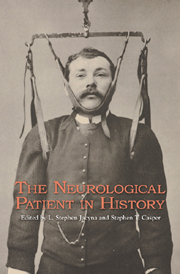Book contents
- Frontmatter
- Contents
- Preface
- Acknowledgments
- Introduction
- Part One Medicine Constructs the “Neurological Patient”
- Part Two Public and Private Constructions of the “Neurological Patient”
- Part Three Patient Groups Construct the “Neurological Patient”
- Part Four The Patient Constructs the “Neurological Patient”
- Part Five Historians Construct the “Neurological Patient”
- 9 Neuropatients in Historyland
- 10 The Neurological Patient in History: A Commentary
- Bibliography
- List of Contributors
- Index
10 - The Neurological Patient in History: A Commentary
from Part Five - Historians Construct the “Neurological Patient”
Published online by Cambridge University Press: 12 September 2012
- Frontmatter
- Contents
- Preface
- Acknowledgments
- Introduction
- Part One Medicine Constructs the “Neurological Patient”
- Part Two Public and Private Constructions of the “Neurological Patient”
- Part Three Patient Groups Construct the “Neurological Patient”
- Part Four The Patient Constructs the “Neurological Patient”
- Part Five Historians Construct the “Neurological Patient”
- 9 Neuropatients in Historyland
- 10 The Neurological Patient in History: A Commentary
- Bibliography
- List of Contributors
- Index
Summary
On the evening of Tuesday, December 2, 2009, at 5:05 pm, Henry Gustav Molaison, aged eighty-two, died of respiratory failure in a nursing home in Connecticut; his death almost coincided, fortuitously, with a workshop on the neurological patient in history some three days later in London, the papers of which comprise this volume. This brief commentary will offer some reflections on the workshop papers, but it begins with Mr. Molaison, known to the world only by his initials, H. M.
Not coincidentally, of course, does this commentary focus on H. M., for H. M. was a historic neurological patient: having lost his sense of the past, unable to form new memories, H. M. featured in a myriad of textbooks and scientific papers. H. M. became immortalized as a case of profound amnesia, the result of an operation to resect his medial temporal lobes in 1953—from his early childhood, H. M. had suffered from epilepsy. “He has taught us a great deal about the cognitive and neural organization of memory. We are in his debt,” as one neuroscientist would write many years later, thanking H. M. for his persistent “dedication to research.” “What's new with the amnesic patient H. M.?” she asked affectionately in her article of the same title.
As an object of neuroscience, as a familiar, patient persona, H. M. enjoyed, it would seem, unusual degrees of intimacy and individuation; his obituaries, though, would strangely lack a sense of agency and self, indeed, that of a biography.
- Type
- Chapter
- Information
- The Neurological Patient in History , pp. 223 - 230Publisher: Boydell & BrewerPrint publication year: 2012



